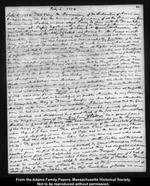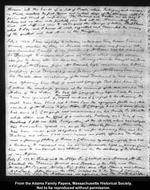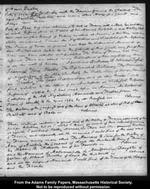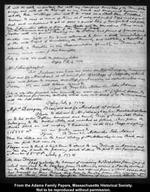July 4. 1778
July 4. 1778
This being the Anniversary of the Declaration of American Independence, We had the honour of the Company of all the American Gentlemen and Ladies, in and about Paris, to dine with Dr. Franklin and me, at Passi, together with a few of the French Gentlemen in the Neighbourhood, Mr. Chaumont,Mr. Brillon, Mr. Vaillant, Mr. Grand, Mr. Beaudoin, Mr. Gerard De Rayneval, the Abby's Challut and Arnoud &c. Mr. Izzard and Dr. Franklin were upon such Terms, that Franklin would not have invited him, and I know not that Izzard would have accepted the Invitation if he had. But I said to Mr. Franklin that I would invite him, and I believe Dr. Smith and all the rest that he omitted and bring them all together and compell them if possible to forget their Animosities.Franklin consented, and I sent Cards to them in my name only. The others were invited in the Names of both of Us. The Day was passed joyously enough and no ill humour appeared from any quarter: Afterwards Mr. Izzard said to me, that he thought We should have had some of the Gentlemen of that Country: He would not allow those we had to be the Gentlemen of the Country. They were not Ministers of State, nor Ambassadors, nor Princes, Nor Dukes, nor Peers, nor Marquises, nor Cardinals, nor Archbishops, nor Bishops. But neither our Furniture, nor our Finances would have born Us out in such an Ostentation. We should have made a most ridiculous figure in the Eyes of such Company. Besides the Ministers of State never dine from [illegible] home unless it be with one another at the Castle: And We were not yet acknowledged, as public Ministers, by any Sovereign in Europe, but the King of France: therefore no Ambassador or other public Minister could have accepted our invitation. I know very well that the Company We had and the Society with which Dr. Franklin generally associated were disliked and disapproved by a great Body of the first and soundest People in the Kingdom. Some of them had been "fletris," by a grand Court Martial or Court of Inquiry, who which had been appointed on the Beginning of this Reign, or the latter End of the last consisting of the Marshalls of France whose Report I have read. These great People I now speak of, were, I know, very much disgusted, at our living at Passi and in the house of Mr. Chaumont. But this Step had been taken before my Arrival, and what could We do? The Circle in question, revolved round Mr. De Sartine and the Count de Vergennes, and were countenanced probably by Count Maurepas, whose departure from the first Intention of the present King had disgusted and driven from Court, first Mr. Malesherbes and next Mr. Turgot. I have not at present the Books and Papers, which I have seen and read, and if I had it would be endless as well as useless, to devellope the State of Parties in France at the Close of the Reign of Louis the 15th, and at the Commencement of that of Louis the Sixteenth. By those Revolutions of Parties We were
thrown into the hands of a Sett of People, whose Intrigues, and mercenary Views, involved the first Years and indeed days of the Alliance with Suspicion and Want of confidence. The Persons and Parties are all dead, I believe, and no Man will probably ever look into the Memorials of those times with sufficient care to distinguish the Springs of Action. But I know what I say and I know it was regretted and lamented by many of the greatest and best Men in the Kingdom.
thrown into the hands of a Sett of People, whose Intrigues, and mercenary Views, involved the first Years and indeed days of the Alliance with Suspicion and Want of confidence. The Persons and Parties are all dead, I believe, and no Man will probably ever look into the Memorials of those times with sufficient care to distinguish the Springs of Action. But I know what I say and I know it was regretted and lamented by many of the greatest and best Men in the Kingdom.




